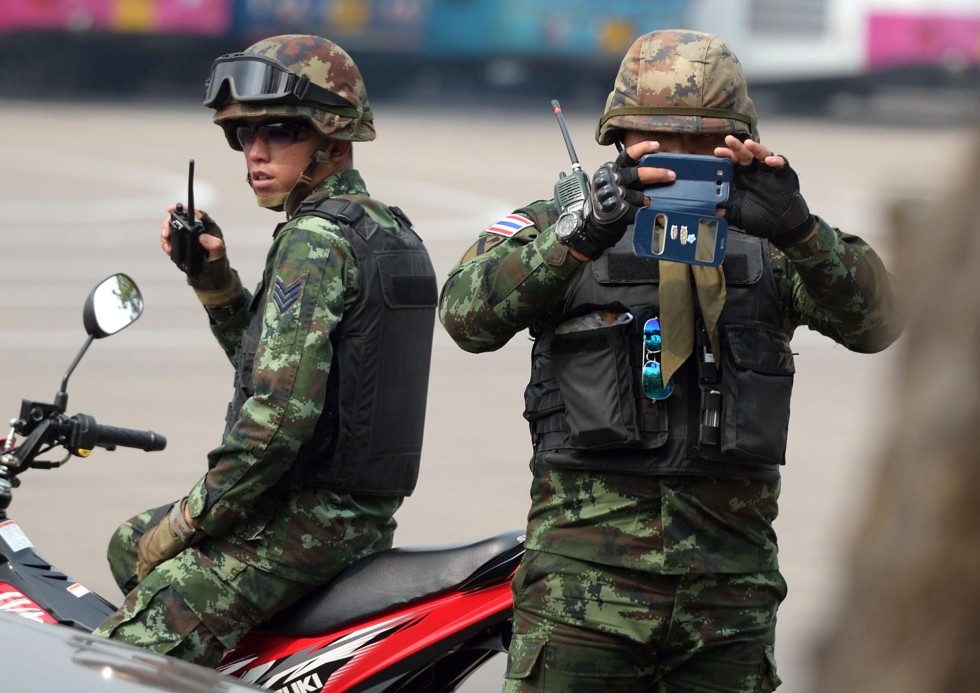Thailand's laws being used more often to silence journalists
Ones on criminal defamation and computer crimes now being applied to a wave of prosecutions, making foreign, local media wary
PUBLISHED : Sunday, 01 February, 2015, 10:16pm
UPDATED : Sunday, 01 February, 2015, 10:16pm
David Eimer in Bangkok

A Thai soldier takes pictures of members of the media, who are feeling more threatened by laws aimed at restricting their work.Photo: AFP
Thailand's restrictive laws on criminal defamation and computer crimes are increasingly being used to silence both the foreign and local media and human rights activists.
The country is already known for having the strictest lèse-majesté laws in the world, effectively preventing any public discussion of the monarchy.
Now, Thailand is experiencing a wave of prosecutions that appear designed to mute journalists and activists writing or speaking out about corruption and human rights abuses especially.
That has made the local and foreign media increasingly wary about what stories they cover.
"I don't think there's any question that this is the least free environment for journalists in Thailand that I've ever known," said Jonathan Head, the president of the Foreign Correspondents Club of Thailand, who has been covering the country on and off since 2000.
"These draconian laws - criminal defamation, the computer crime act and lèse-majesté - are being misused to silence journalists, not just by the authorities, but by other people too."
In Thailand, both simple defamation and libel are offences under the country's criminal code, while the computer crime act makes posting any defamatory material online illegal. Being able to prove that the libellous or defamatory statement is true is not at defence against such charges in the country. If the court finds that the statements damaged the reputation of the person, then defendants can find themselves facing prison and hefty fines.
Last month, British journalist Andrew Drummond left Thailand after 25 years, his patience and financial resources exhausted after four years of fighting criminal defamation charges. Most were brought by people convicted of crimes in other countries who Drummond had reported on.
"I've won most of the cases, but I have decided that I will not waste my time anymore," said Drummond.
"Cases can last for years in Thailand … so the person with the most money will usually win because defendants do not have the cash to fight. Journalists certainly do not."
Many criminal defamation cases are brought simply because in Thai culture, reputation is everything. "A lot of this is about saving face," said Yingcheep Atchanont, the advocacy officer for iLaw, a Bangkok-based NGO that monitors freedom of expression in Thailand.
The laws are effective at intimidating domestic journalists in particular.
"There is some self-censorship on our part and the part of others. But then the vagueness of Thai laws has always made that necessary," said Alan Morison, an Australian journalist who works for Phuketwan, a news website on the island of Phuket.
Morison is facing charges over the use of a quote from a Reuters article in a story he and a Thai colleague wrote last year about the trafficking of Rohingya refugees from Myanmar to Thailand.
While there has been an increase in the number of lese-majeste cases being brought to court since last May's coup, when the military overthrew Yingluck Shinawatra's ruling Pheu Thai Party, the misuse of the criminal defamation law has gone on for some time. What has changed in the last year is that defendants are increasingly being charged under both the criminal defamation law and the computer crime act.
"What we are seeing more and more is the use of the criminal defamation law with the computer crime act. It wasn't that way before. The computer crime act wasn't really used that much," said Yingcheep Atchanont. "By using the two laws together, the penalty becomes more serious and the defendant has a bigger burden to prove their case."
Andy Hall, a British rights activist, is fighting criminal defamation and computer crimes charges for writing a report for a Finnish NGO detailing alleged rights abuses in the Thai fishing industry.
"The law is a deterrent, especially for Thai people. The problem is that anyone can bring a case and if there's any sort of evidence, the case goes ahead," Hall said.
